人教版(2019)必修第一册Unit4 Natural disasters定语从句课件-(17张ppt)
文档属性
| 名称 | 人教版(2019)必修第一册Unit4 Natural disasters定语从句课件-(17张ppt) | 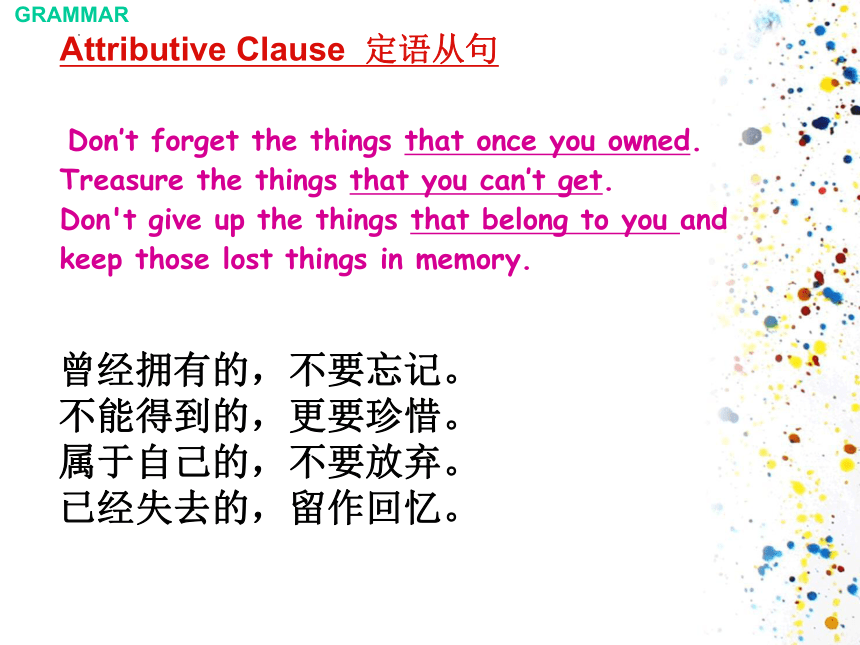 | |
| 格式 | pptx | ||
| 文件大小 | 1012.7KB | ||
| 资源类型 | 教案 | ||
| 版本资源 | 人教版(2019) | ||
| 科目 | 英语 | ||
| 更新时间 | 2022-11-18 12:56:42 | ||
图片预览


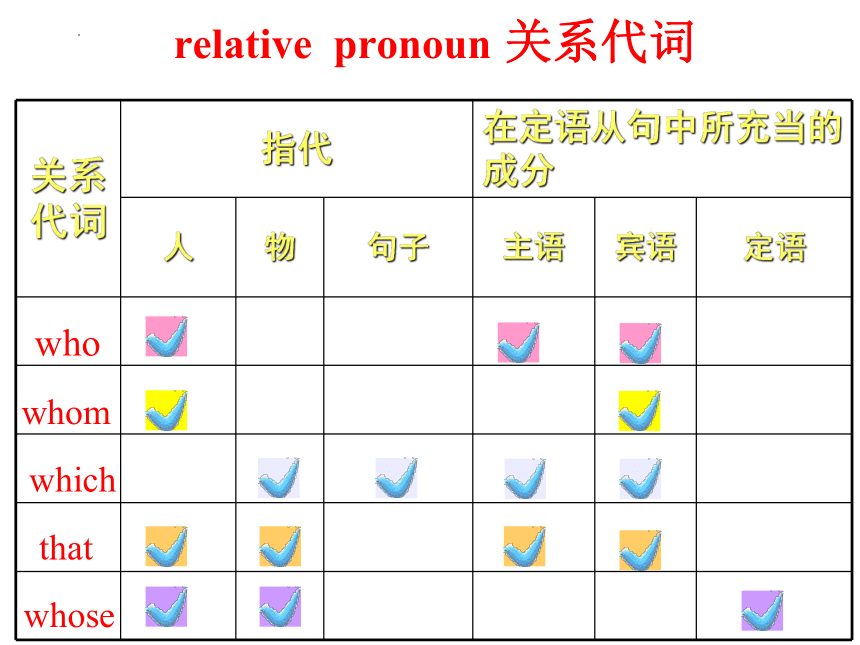
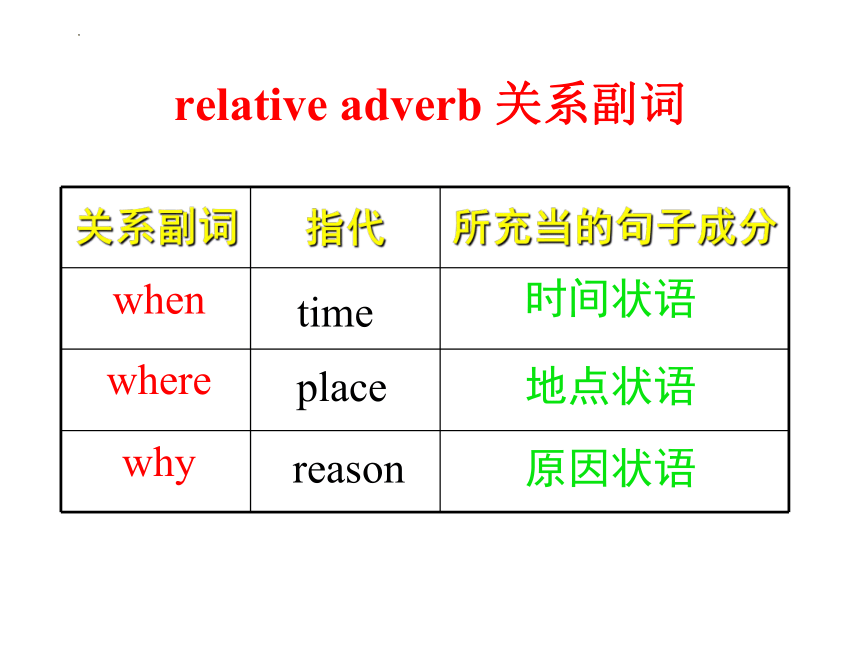
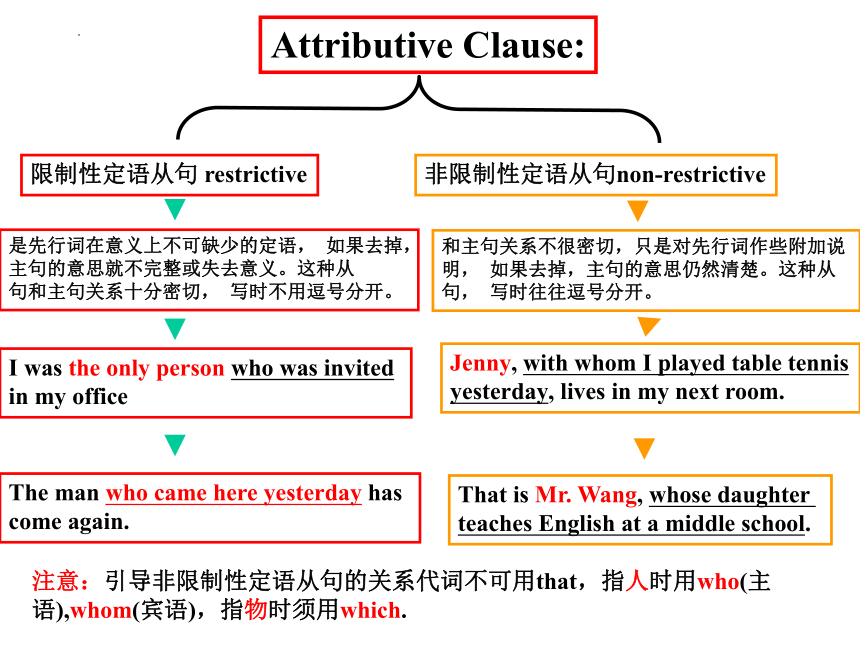
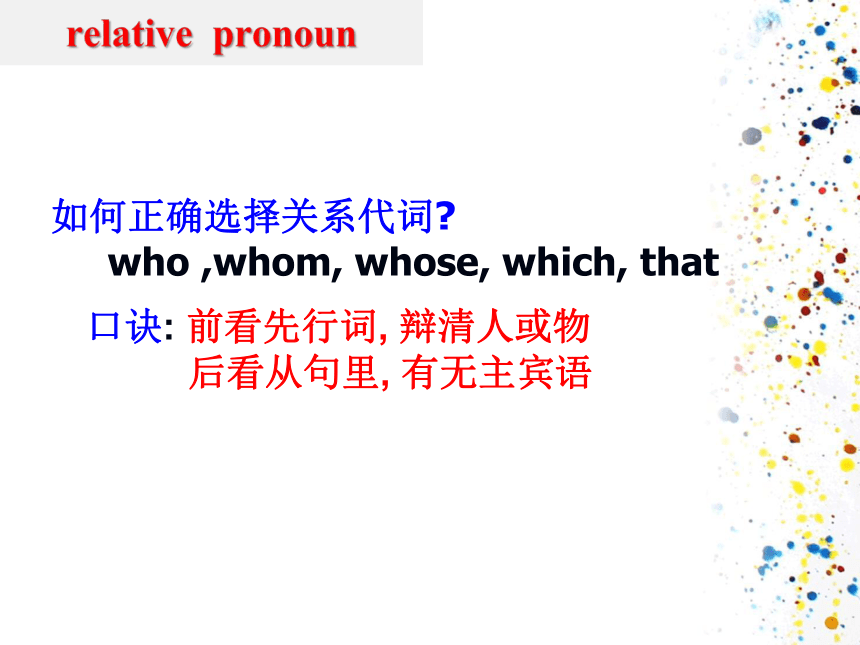
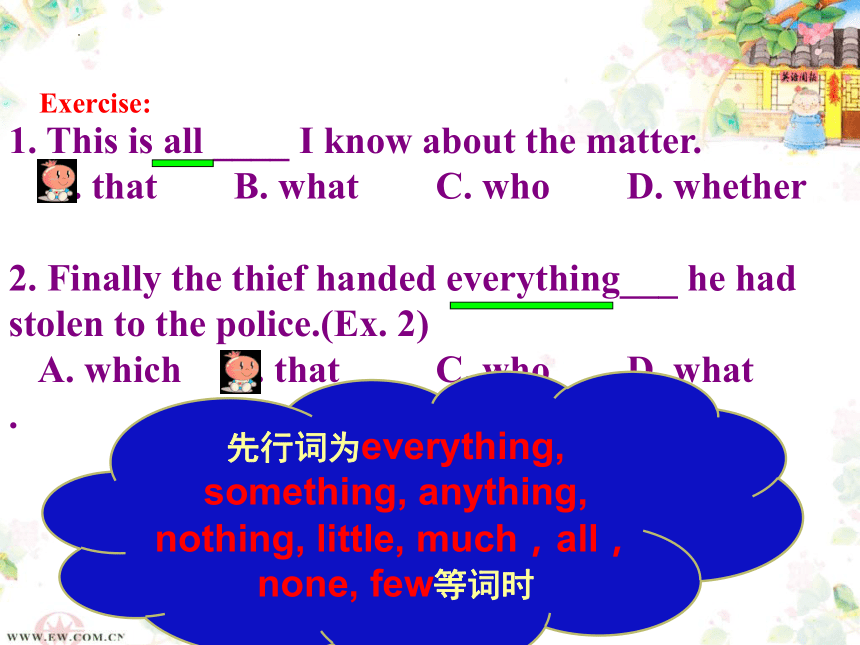
文档简介
(共17张PPT)
GRAMMAR
Attributive Clause 定语从句
Don’t forget the things that once you owned. Treasure the things that you can’t get.
Don't give up the things that belong to you and keep those lost things in memory.
曾经拥有的,不要忘记。
不能得到的,更要珍惜。
属于自己的,不要放弃。
已经失去的,留作回忆。
The girl who/that sits near the door is Shou Jiayin.
什么是定语从句?
在复合句中,起形容词作用,修饰名词或代词的从句就叫定语从句。(放在被修饰成分之后)
先行词
关系词
定语从句
先行词:被定语从句所修饰的名词或代词。
关系词
1.关系代词 2.关系副词
relative pronoun 关系代词
关系代词 指代 在定语从句中所充当的成分
人 物 句子 主语 宾语 定语
who
whom
which
that
whose
relative adverb 关系副词
关系副词 指代 所充当的句子成分
when
where
why
time
place
reason
时间状语
地点状语
原因状语
Attributive Clause:
限制性定语从句 restrictive
非限制性定语从句non-restrictive
是先行词在意义上不可缺少的定语, 如果去掉,主句的意思就不完整或失去意义。这种从
句和主句关系十分密切, 写时不用逗号分开。
和主句关系不很密切,只是对先行词作些附加说明, 如果去掉,主句的意思仍然清楚。这种从句, 写时往往逗号分开。
I was the only person who was invited
in my office
Jenny, with whom I played table tennis
yesterday, lives in my next room.
The man who came here yesterday has
come again.
That is Mr. Wang, whose daughter
teaches English at a middle school.
注意:引导非限制性定语从句的关系代词不可用that,指人时用who(主语),whom(宾语),指物时须用which.
如何正确选择关系代词
who ,whom, whose, which, that
口诀: 前看先行词, 辩清人或物
后看从句里, 有无主宾语
relative pronoun
1. This is all ____ I know about the matter.
A. that B. what C. who D. whether
2. Finally the thief handed everything___ he had stolen to the police.(Ex. 2)
A. which B. that C. who D. what
.
Exercise:
先行词为everything, something, anything, nothing, little, much,all,none, few等词时
4. He talked happily about the men and books
_____ interested him greatly in the school.
A. which B. that C. it D. whom
5. This is the second book _____ he has ever written.
A. that B. which C. when D. of that
6. He was the best king ____ever ruled the country.
A. that B. which C. where D. in that
6. Is oxygen the only gas _____ helps fire burn
A. it B. / C. which D. that
7. Which was the hotel _____ was recommended to you
where B. which C. that D. it
8. Mary is no longer the girl ___ she used to be.
A. who B. whom C. that D. which
先行词为人和物的组合
关系代词在从句中作表语时。
若主句中有疑问代词 who 或者 which,为了避免重复, 关系代词不要再用 who, which,而用 that。
先行词前有序数词(the first),形容词最高级(the best), the last, the very, the only 等时。
只用that的情况
1.当先行词为all, much, little, few, none, something, anything, everything, nothing等不定代词时
2.当先行词既指人又指物时
relative pronoun
4.主句的主语是疑问词who, which, what 时,定语从句用that而不用who, (whom)和which引导。
5.当关系代词在从句中作表语时:
3.先行词被序数词或形容词最高级,或the only, the very, the last修饰时
6.主句是there be 句型且关系词在从句中作主语时
There is a seat in the corner that is still available.
relative pronoun
先行词为物时只能用which 的情况
1. Dorothy was always speaking highly of her role in the play, ____, of course, made the others unhappy.(Ex. 5)
A. who B. which C. this D. what
B
1.引导非限定性定语从句
在非限定性定语从句中,其先行词可是一个词,句子的一部分,也可是整个句子
relative pronoun
先行词为物时只能用which 的情况
The tool with which he is working is called a hammer.
2.动词短语里的介词提前时,直接放在介词后面作宾语时
3.先行词后面有插入语时
4.先行词是that时
relative pronoun
先行词为人时只能用who的情况
①当先行词为those, one, ones等词 或为人称代词时
③在there be 句型中,先行词指人时
②先行词为-body, -one构成的不定代词时
Women who drink more than two cups of coffee a day have a greater chance of having heart disease than those ____ don’t. (Ex. 7)
A. / B. whom C. who D. that
C
Anyone ____ this opinion may speak out. (Ex. 11)
A. that againsts B. that against
C. who is against D. who are against
C
There is an old man who wants to see you.
1.直接引导定语从句: 作用相当于which,但句首只用as
As we all know, the earth is round.
2.与such或same 连用, 引起定语从句
There are no such writers as you mention.
relative pronoun
Other Tips
1.关系代词as 的用法
3.as 与 which 的区别
as 在从句中作主语时,后面常接行为动词的被动语态,如be known, be said,be reported等;如从句中行为动词是主动语态,一般要用which作主语
She has been late again,
as was expected.
2) Tom has made great progress,
which makes us happy.
Is this factory ____ some foreign friends visited last Friday ( Ex. 15)
A. that B. where C. in which D. the one
relative pronoun
2. 必须要有先行词才会有定语从句
Other Tips
D
3. 关系代词作宾语且前面没有介词时才可以省略,其他情况不可省略。
I have never been to Beijing, but it is the place _________. ( Ex. 3)
A. that I want to visit it most B. where I’d like to visit C. in which I’d like to visit D. I most want to visit
D
relative adverb
1. when 指时间,在定语从句中做时间状语。
I still remember the day when I first came to the school.
2. where 指地点,在定语从句中做地点状语。
Huangshan is the city where I was born.
3. why 指原因,在定语从句中做原因状语。
I don’t know the reason why he looks unhappy today.
4.关系副词when, where, why的含义相当于"介词+ which"
Do you remember the day when (on which) you joined our club
Huangshan is the place where (in which) I was born.
Is this the reason why (for which) he refused our help
relative adverb
定语从句三步曲:
第一 找出先行词
第二 看关系词在定语从句中的
语法功能(做主语、宾语或状语)
第三 选择合适的关系词
GRAMMAR
Attributive Clause 定语从句
Don’t forget the things that once you owned. Treasure the things that you can’t get.
Don't give up the things that belong to you and keep those lost things in memory.
曾经拥有的,不要忘记。
不能得到的,更要珍惜。
属于自己的,不要放弃。
已经失去的,留作回忆。
The girl who/that sits near the door is Shou Jiayin.
什么是定语从句?
在复合句中,起形容词作用,修饰名词或代词的从句就叫定语从句。(放在被修饰成分之后)
先行词
关系词
定语从句
先行词:被定语从句所修饰的名词或代词。
关系词
1.关系代词 2.关系副词
relative pronoun 关系代词
关系代词 指代 在定语从句中所充当的成分
人 物 句子 主语 宾语 定语
who
whom
which
that
whose
relative adverb 关系副词
关系副词 指代 所充当的句子成分
when
where
why
time
place
reason
时间状语
地点状语
原因状语
Attributive Clause:
限制性定语从句 restrictive
非限制性定语从句non-restrictive
是先行词在意义上不可缺少的定语, 如果去掉,主句的意思就不完整或失去意义。这种从
句和主句关系十分密切, 写时不用逗号分开。
和主句关系不很密切,只是对先行词作些附加说明, 如果去掉,主句的意思仍然清楚。这种从句, 写时往往逗号分开。
I was the only person who was invited
in my office
Jenny, with whom I played table tennis
yesterday, lives in my next room.
The man who came here yesterday has
come again.
That is Mr. Wang, whose daughter
teaches English at a middle school.
注意:引导非限制性定语从句的关系代词不可用that,指人时用who(主语),whom(宾语),指物时须用which.
如何正确选择关系代词
who ,whom, whose, which, that
口诀: 前看先行词, 辩清人或物
后看从句里, 有无主宾语
relative pronoun
1. This is all ____ I know about the matter.
A. that B. what C. who D. whether
2. Finally the thief handed everything___ he had stolen to the police.(Ex. 2)
A. which B. that C. who D. what
.
Exercise:
先行词为everything, something, anything, nothing, little, much,all,none, few等词时
4. He talked happily about the men and books
_____ interested him greatly in the school.
A. which B. that C. it D. whom
5. This is the second book _____ he has ever written.
A. that B. which C. when D. of that
6. He was the best king ____ever ruled the country.
A. that B. which C. where D. in that
6. Is oxygen the only gas _____ helps fire burn
A. it B. / C. which D. that
7. Which was the hotel _____ was recommended to you
where B. which C. that D. it
8. Mary is no longer the girl ___ she used to be.
A. who B. whom C. that D. which
先行词为人和物的组合
关系代词在从句中作表语时。
若主句中有疑问代词 who 或者 which,为了避免重复, 关系代词不要再用 who, which,而用 that。
先行词前有序数词(the first),形容词最高级(the best), the last, the very, the only 等时。
只用that的情况
1.当先行词为all, much, little, few, none, something, anything, everything, nothing等不定代词时
2.当先行词既指人又指物时
relative pronoun
4.主句的主语是疑问词who, which, what 时,定语从句用that而不用who, (whom)和which引导。
5.当关系代词在从句中作表语时:
3.先行词被序数词或形容词最高级,或the only, the very, the last修饰时
6.主句是there be 句型且关系词在从句中作主语时
There is a seat in the corner that is still available.
relative pronoun
先行词为物时只能用which 的情况
1. Dorothy was always speaking highly of her role in the play, ____, of course, made the others unhappy.(Ex. 5)
A. who B. which C. this D. what
B
1.引导非限定性定语从句
在非限定性定语从句中,其先行词可是一个词,句子的一部分,也可是整个句子
relative pronoun
先行词为物时只能用which 的情况
The tool with which he is working is called a hammer.
2.动词短语里的介词提前时,直接放在介词后面作宾语时
3.先行词后面有插入语时
4.先行词是that时
relative pronoun
先行词为人时只能用who的情况
①当先行词为those, one, ones等词 或为人称代词时
③在there be 句型中,先行词指人时
②先行词为-body, -one构成的不定代词时
Women who drink more than two cups of coffee a day have a greater chance of having heart disease than those ____ don’t. (Ex. 7)
A. / B. whom C. who D. that
C
Anyone ____ this opinion may speak out. (Ex. 11)
A. that againsts B. that against
C. who is against D. who are against
C
There is an old man who wants to see you.
1.直接引导定语从句: 作用相当于which,但句首只用as
As we all know, the earth is round.
2.与such或same 连用, 引起定语从句
There are no such writers as you mention.
relative pronoun
Other Tips
1.关系代词as 的用法
3.as 与 which 的区别
as 在从句中作主语时,后面常接行为动词的被动语态,如be known, be said,be reported等;如从句中行为动词是主动语态,一般要用which作主语
She has been late again,
as was expected.
2) Tom has made great progress,
which makes us happy.
Is this factory ____ some foreign friends visited last Friday ( Ex. 15)
A. that B. where C. in which D. the one
relative pronoun
2. 必须要有先行词才会有定语从句
Other Tips
D
3. 关系代词作宾语且前面没有介词时才可以省略,其他情况不可省略。
I have never been to Beijing, but it is the place _________. ( Ex. 3)
A. that I want to visit it most B. where I’d like to visit C. in which I’d like to visit D. I most want to visit
D
relative adverb
1. when 指时间,在定语从句中做时间状语。
I still remember the day when I first came to the school.
2. where 指地点,在定语从句中做地点状语。
Huangshan is the city where I was born.
3. why 指原因,在定语从句中做原因状语。
I don’t know the reason why he looks unhappy today.
4.关系副词when, where, why的含义相当于"介词+ which"
Do you remember the day when (on which) you joined our club
Huangshan is the place where (in which) I was born.
Is this the reason why (for which) he refused our help
relative adverb
定语从句三步曲:
第一 找出先行词
第二 看关系词在定语从句中的
语法功能(做主语、宾语或状语)
第三 选择合适的关系词
